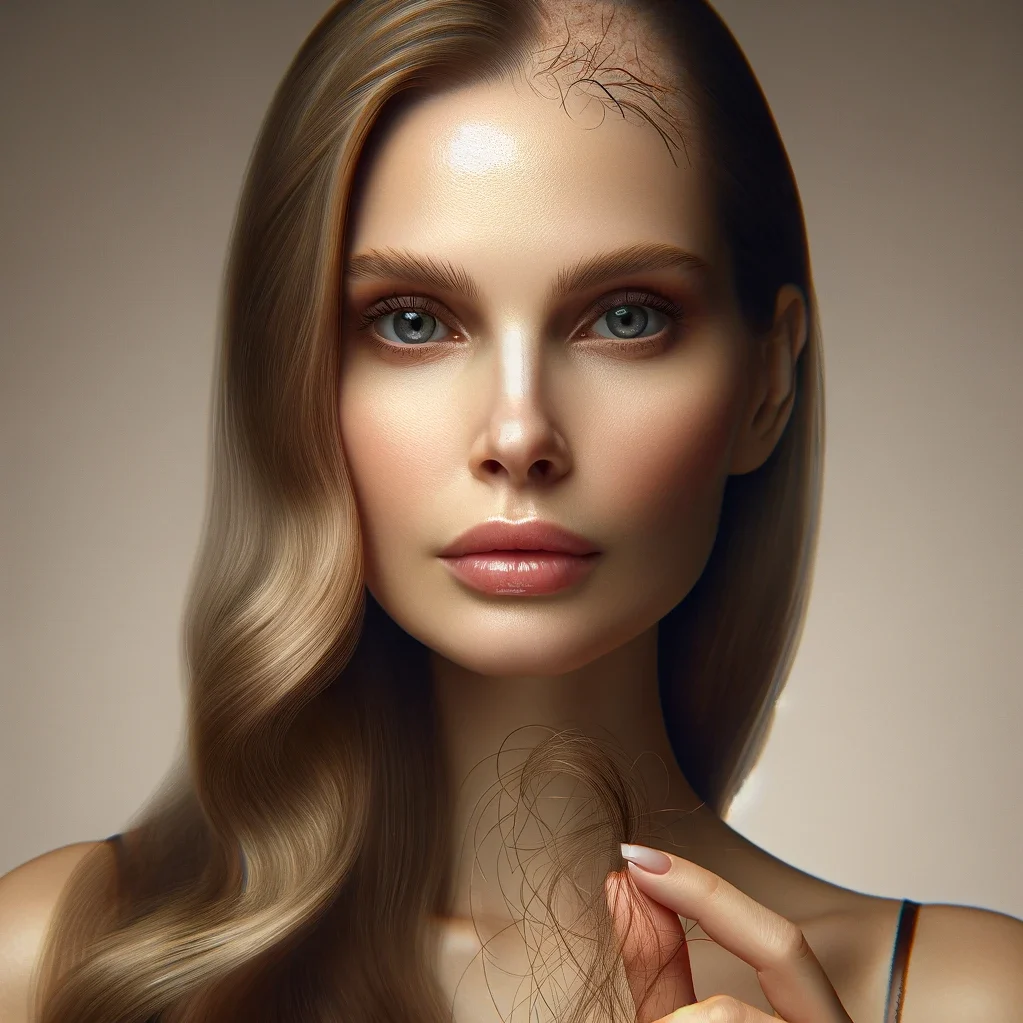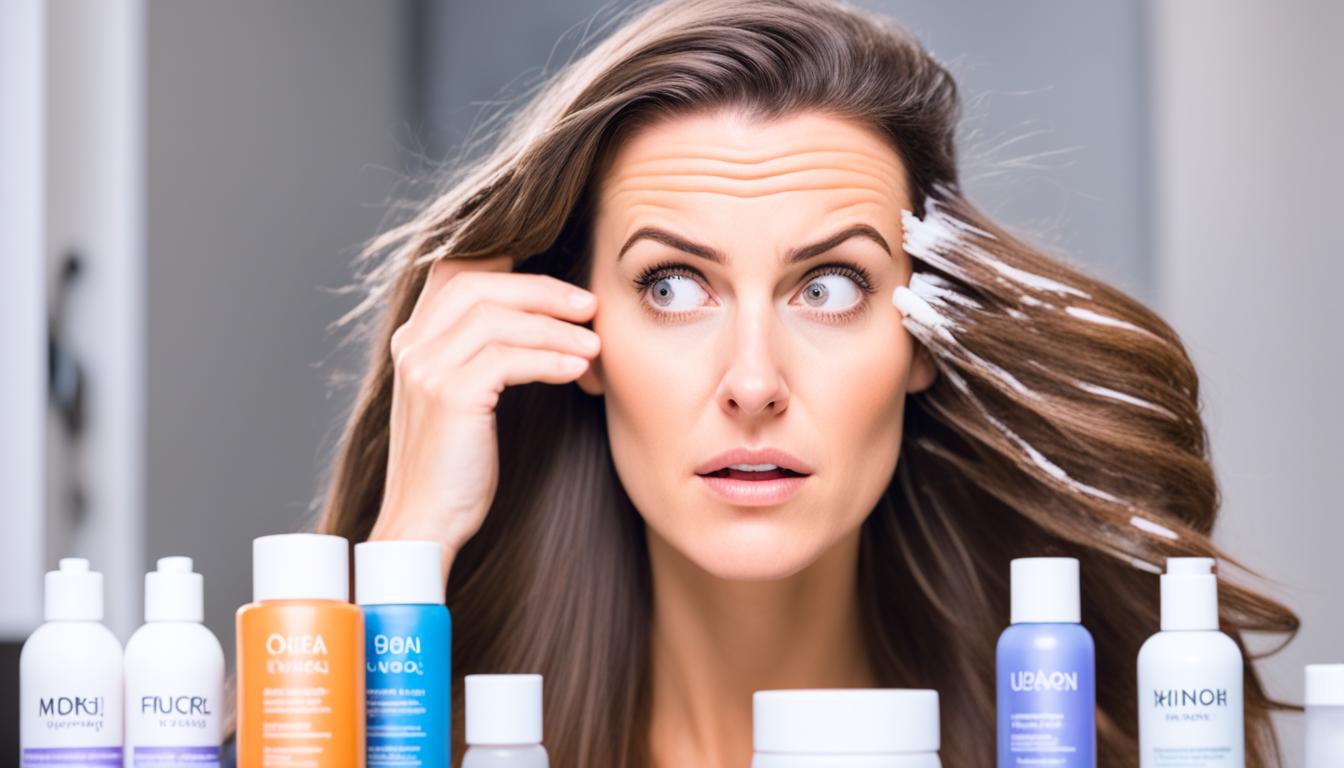Hair fall is a common issue that affects many people. While losing around 100 hairs a day is normal, excessive hair loss can be distressing. In order to combat hair fall, it is important to identify and address the underlying causes. Medical conditions, stress, and hormonal changes can contribute to hair loss. However, there are several effective tips and solutions available to prevent and control hair fall.
In this article, we will explore some of the best practices for hair care, as well as medical treatments that can help in combating hair fall. Whether you are experiencing hair thinning, balding, or simply looking to improve the health of your hair, we’ve got you covered.
Key Takeaways:
- Identify and address the underlying causes of hair fall, such as medical conditions, stress, and hormonal changes.
- Implement proper hair care practices, including regular hair washing, use of natural oils like coconut or olive oil, and gentle styling techniques.
- Consider medical treatments like laser therapy, platelet-rich plasma, minoxidil, or finasteride for severe hair loss.
- Explore hair growth treatment options and remedies to stimulate hair growth and prevent further hair fall.
- Remember that consistency and patience are key when it comes to combating hair fall and achieving healthier hair.
Hair Care Tips to Prevent Hair Fall
In addition to addressing the underlying causes of hair fall, proper hair care can also play a crucial role in preventing further hair loss. By following these effective hair care tips, you can promote healthier hair and reduce the risk of excessive hair fall:
A gentle approach to hair washing
When washing your hair, use lukewarm water instead of hot water as high temperatures can strip away natural oils, leading to dryness and breakage. Opt for a mild, sulfate-free shampoo that suits your hair type and massage it gently into your scalp using your fingertips. Rinse thoroughly to ensure no residue is left behind.
Nourishing with natural oils
Coconut oil and olive oil have long been known for their nourishing properties for hair. Apply a small amount of warm coconut oil or olive oil to your scalp and hair, focusing on the ends. Leave it on for at least 30 minutes or overnight before washing it off. These oils can help moisturize and strengthen the hair, reducing the risk of breakage.
Gentle styling techniques
Avoid harsh styling techniques such as tight ponytails, braids, or excessive use of heat styling tools. These can put strain on the hair follicles and lead to breakage. Opt for loose hairstyles, use heat protectant sprays before using hot tools, and give your hair regular breaks from styling to minimize damage.
Minimize hair processing
Chemical treatments, such as perming, coloring, and straightening, can weaken the hair and cause damage. If possible, limit the frequency of these treatments and opt for gentler alternatives. Consider natural hair dyes or seek the help of a professional stylist who can suggest less damaging options.
“Proper care and nourishment are essential for maintaining healthy hair. By incorporating these hair care tips into your routine, you can take proactive steps towards preventing hair fall and promoting strong, beautiful hair.”
| Hair Care Tips | Benefits |
|---|---|
| Use lukewarm water for hair washing | Preserves natural oils and prevents dryness |
| Apply coconut oil or olive oil for nourishment | Moisturizes and strengthens the hair |
| Avoid harsh styling techniques | Reduces hair breakage and damage |
| Minimize hair processing | Protects against chemical damage |
Medical Treatments for Hair Fall
In some cases, addressing severe hair loss may require medical treatments. Fortunately, there are several effective options available that have shown promising results in combating hair fall.
Laser therapy: Also known as low-level laser therapy (LLLT), this treatment involves using red light or laser devices to stimulate hair growth. The lasers work by increasing blood circulation in the scalp and promoting hair follicle activity. Laser therapy is a non-invasive procedure that can be performed in a medical setting or even at home with handheld devices.
Platelet-rich plasma (PRP) therapy: PRP therapy is a regenerative treatment that utilizes the patient’s own blood to promote hair growth. The process involves drawing a small amount of blood, processing it to isolate the platelet-rich plasma, and then injecting it into the scalp. PRP contains growth factors that stimulate the hair follicles, leading to improved hair density and thickness.
Minoxidil: Minoxidil is a topical medication that is applied to the scalp to stimulate hair growth. It effectively prolongs the anagen (growth) phase of the hair cycle and increases the size of hair follicles. Minoxidil is available over-the-counter and is commonly used as a treatment for androgenic alopecia, also known as male or female pattern baldness.
Finasteride: Finasteride is an oral medication that is primarily used to treat male pattern baldness. It works by inhibiting the conversion of testosterone to dihydrotestosterone (DHT), a hormone that can shrink the hair follicles and lead to hair loss. Finasteride is available by prescription only and should be taken under the guidance of a healthcare professional.
When considering medical treatments for hair fall, it is important to consult with a qualified healthcare provider who specializes in hair restoration. They can assess your specific condition and recommend the most suitable treatment options tailored to your needs. While these medical treatments can be effective, it’s always important to remember that results may vary depending on individual factors.
FAQ
What causes hair fall?
Hair fall can be caused by various factors, including medical conditions, stress, hormonal changes, and genetics. It is important to identify the underlying cause in order to address and control hair fall.
How can I prevent hair fall naturally?
There are several natural remedies that can help prevent hair fall. These include maintaining a healthy diet, avoiding excessive heat and chemical treatments, reducing stress levels, and regularly massaging the scalp with essential oils.
Are there any effective hair growth treatments available?
Yes, there are various hair growth treatments available that have shown effectiveness in combating hair fall. These include laser therapy, platelet-rich plasma (PRP) treatment, and the use of medications such as minoxidil and finasteride.
How often should I wash my hair to prevent hair fall?
The frequency of hair washing depends on your hair type and lifestyle. However, it is generally recommended to wash your hair every 2-3 days to maintain scalp hygiene and prevent excessive hair fall.
Is coconut oil effective in preventing hair fall?
Coconut oil can help nourish and strengthen the hair, reducing the risk of hair fall. It is recommended to massage warm coconut oil into the scalp and leave it overnight before washing it off with a mild shampoo.
Can hair styling products and treatments contribute to hair fall?
Excessive use of hair styling products and treatments, such as heat styling tools, chemical treatments, and tight hairstyles, can damage the hair and contribute to hair fall. It is important to use these products sparingly and opt for gentle styling methods to prevent hair fall.
Should I consult a dermatologist for my hair fall problem?
If you are experiencing excessive hair fall or have concerns about your hair health, it is advisable to consult a dermatologist. They can help diagnose the underlying cause of your hair fall and recommend appropriate treatments or lifestyle changes.
Are there any supplements that can help prevent hair fall?
Certain supplements, such as biotin, vitamins, and minerals, can support hair health and prevent hair fall. However, it is important to consult a healthcare professional before starting any new supplements to ensure they are suitable for you.
Can stress contribute to hair fall?
Yes, stress can contribute to hair fall. High levels of stress can disrupt the normal hair growth cycle and lead to excessive hair shedding. Managing stress through relaxation techniques, exercise, and seeking support can help reduce hair fall caused by stress.
How long does it take to see results from hair growth treatments?
The time it takes to see results from hair growth treatments can vary depending on the individual and the specific treatment. Generally, it can take several months of consistent use before noticeable improvement in hair growth is observed.

